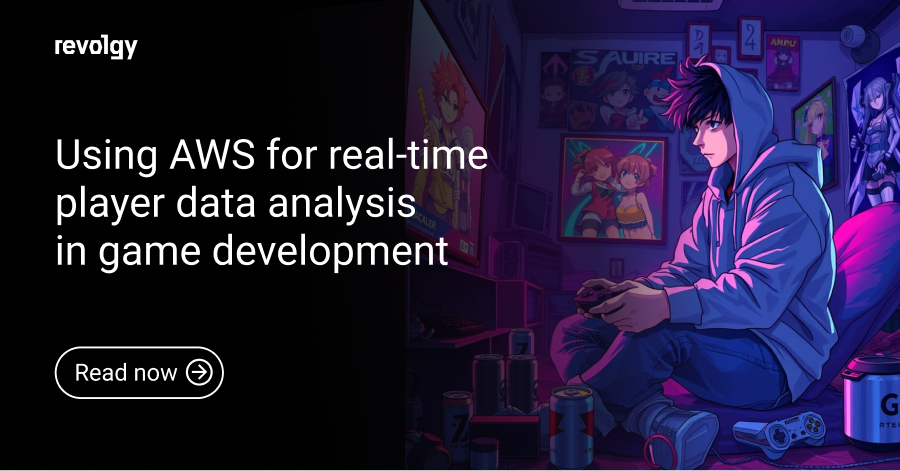AWS, Gaming
How to build and scale smarter skill-based matchmaking with AWS
Matchmaking is the backbone of multiplayer games. If your matchmaking is bad, players won’t stay. No matter how great the rest of the game is, if players get stuck in mismatched games, they’re going to quit.
That’s the problem skill-based matchmaking (SBMM) is trying to solve by pairing players of similar skill levels. But building a solid matchmaking system isn’t easy, especially when you’re dealing with large player bases in different regions.
I recently sat down with Charlie Olsen, co-founder of Invokation Games, to talk about how they’re changing the game when it comes to matchmaking. At Revolgy, we know that leveraging cloud solutions like Amazon Web Services (AWS) can make a huge difference in how these systems are built and scaled. So, we got into how Invokation Games is using AWS to make SBMM easier and better for developers.
Fair matchmaking is key to player satisfaction
“Back when I started working on Call of Duty for China, players expected strong matchmaking,” recalls Charlie Olsen, co-founder of Invokation Games. “In the US, players were more focused on dominating matches, but in China, fair matchmaking was key to player satisfaction.”
One big challenge with SBMM is making sure high-skill players don’t feel like they’re being punished for being good. Charlie pointed out that “if you’re a streamer or a top player, the better you perform, the tougher your opponents get. But viewers don’t know that, and you don’t get any extra rewards.”
From a technical perspective, scaling matchmaking for global titles adds another layer of complexity. With services like Amazon GameLift, game developers can deploy low-latency servers that automatically scale based on demand. “GameLift ensures that we’re not overloading servers or leaving players waiting,” Charlie said. AWS helps manage the traffic so the matchmaking process runs smoothly, even during peak times.
Watch this video on GameLift.
AWS simplifies matchmaking for players and developers
Invokation Games is taking on these challenges with its matchmaking API. Its API allows developers to feed in player data — such as match results, team performance, and individual scores — and get back a new matchmaking rating in return. Thanks to this, developers don’t need to build complex matchmaking algorithms from scratch.
“We provide a matchmaking API that works seamlessly with AWS,” Charlie explained. “It’s pretty simple. Game developers send us data, and we give back the new skill ratings. AWS takes care of the hard stuff behind the scenes, so they don’t have to worry about all the infrastructure.”
One of the common problems with other skill-based matchmaking systems, like TrueSkill, is that they assume a player’s skill level stays the same over time. But in reality, players can have good days, bad days, or improve as they play more.
Invokation’s API fixes this by taking those changes into account. “Our API recognizes that players’ skills can go up or down, so it adjusts the ratings accordingly,” Charlie explained. “This makes matchmaking more accurate and fair because it reflects how players are actually performing at any given time.”
By using AWS tools like Amazon RDS and AWS Lambda, Invokation Games can handle huge amounts of player data really fast. These services let them process all the match results and player stats efficiently, so its API can update skill ratings in real time. This means as players’ performance changes during the game, the matchmaking stays accurate and balanced, keeping the games fair and enjoyable. AWS helps make sure everything runs smoothly behind the scenes without slowing down the game experience.
Is AI the future of matchmaking?
Looking ahead, Charlie and I talked about how matchmaking is going to keep getting smarter. With the help of AI and machine learning tools like AWS SageMaker, developers can now train models that predict how players are going to perform. This takes matchmaking to a whole new level because the system can adjust in real time, making sure players are matched more accurately based on their performance as it happens.
“We’re using AWS to explore how machine learning can help us improve the player experience,” Charlie said. “By analyzing player data in real time, we can make adjustments to matchmaking that keep games fair and fun.”
This means the matchmaking process doesn’t just rely on past performance — it actively learns and adapts, keeping the gameplay balanced even as players improve or have off days. It’s another way AWS helps developers stay ahead, creating smarter, more responsive systems that make multiplayer games more enjoyable for everyone.
As gaming evolves, AWS gives developers the power to build scalable matchmaking systems that grow with their player base. For smaller studios, this means focusing on creating great games without worrying about managing complex infrastructure.
Listen to the full podcast with Invokation Games.
Are you looking for a scalable game development solution? Remāngu by Revolgy is a cloud-based game development platform built on AWS. It provides game studios with scalable GPU workstations, unlimited storage, managed Perforce, and CI/CD pipelines for smooth development and playtesting, all accessible remotely with low latency.




